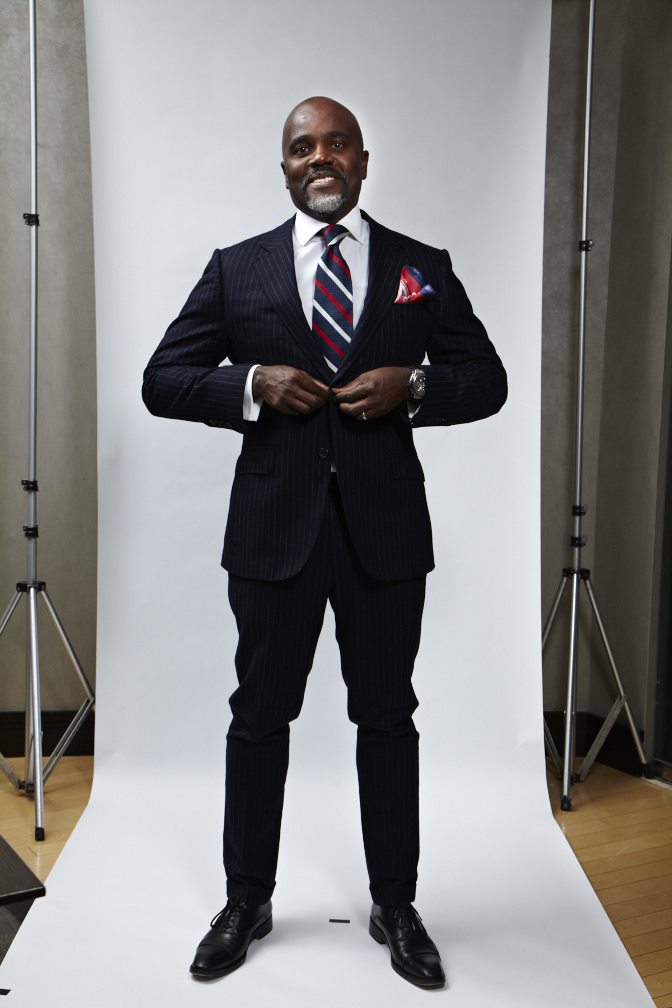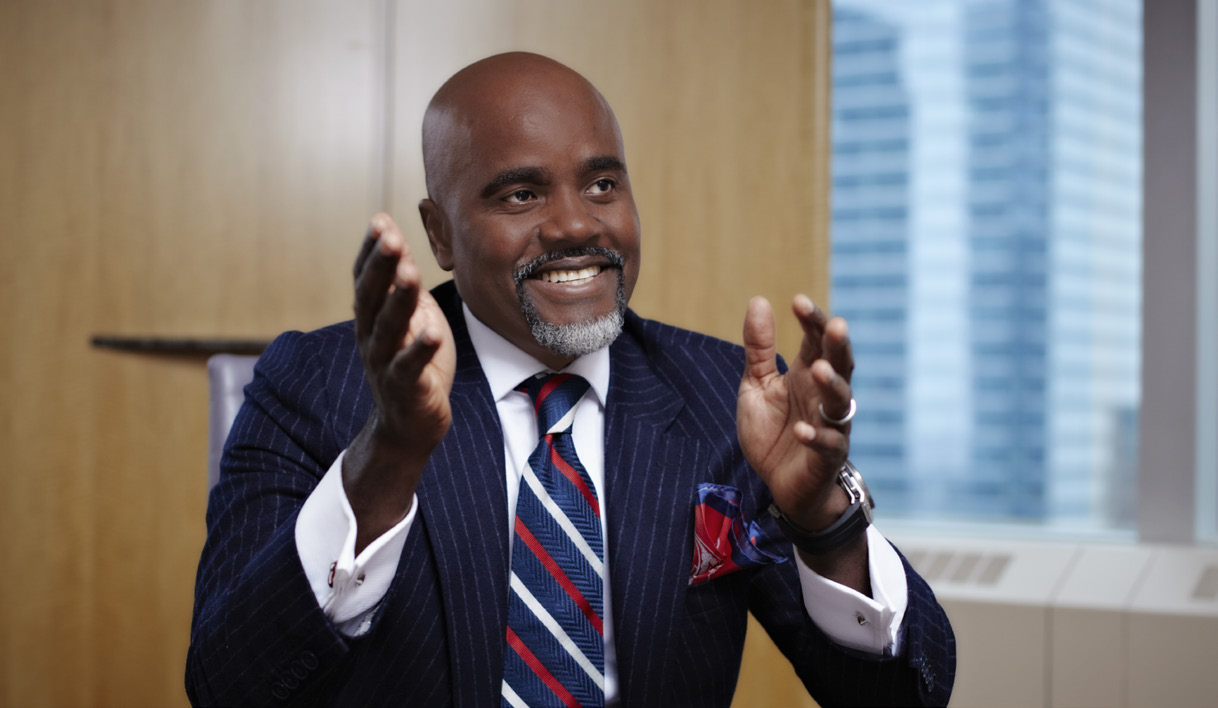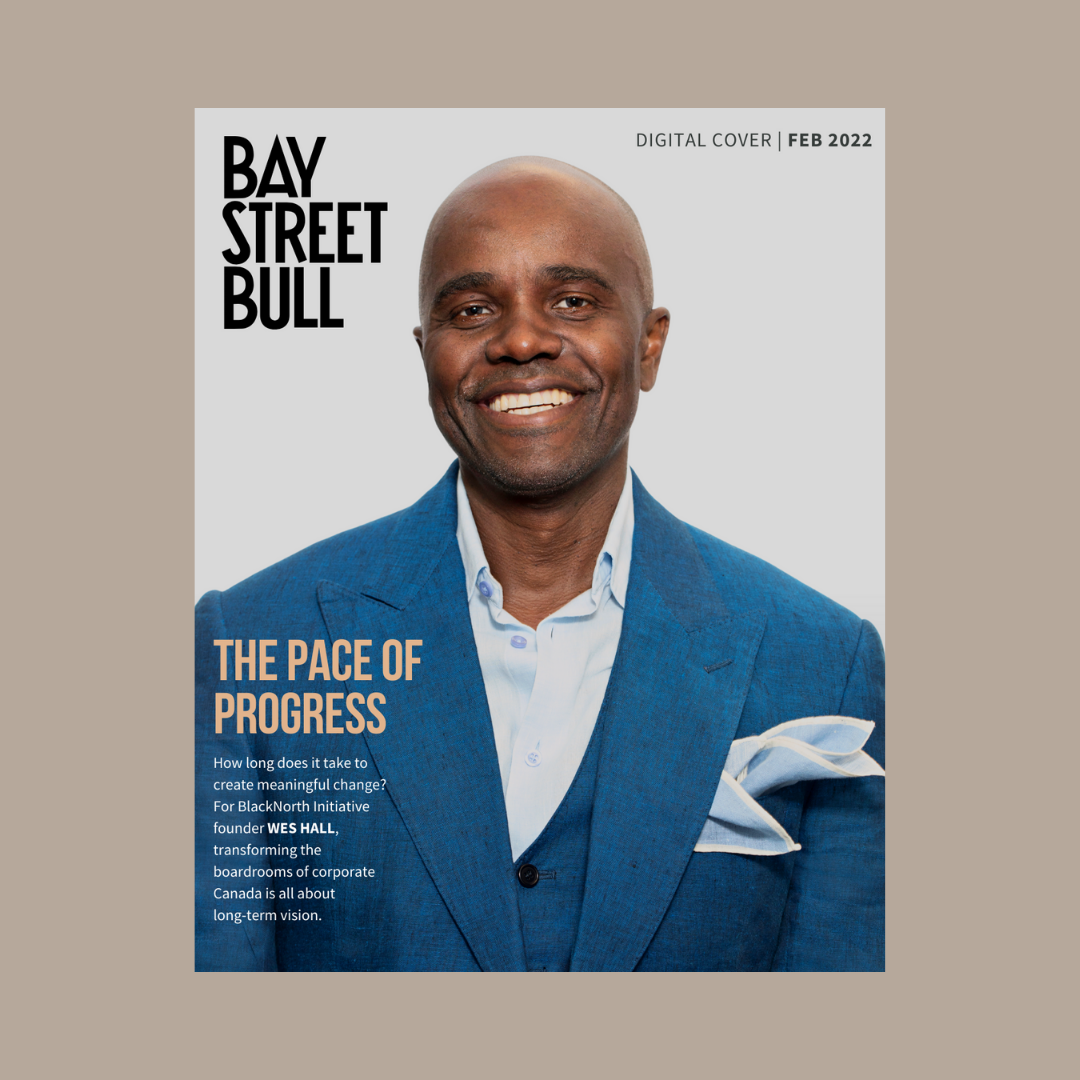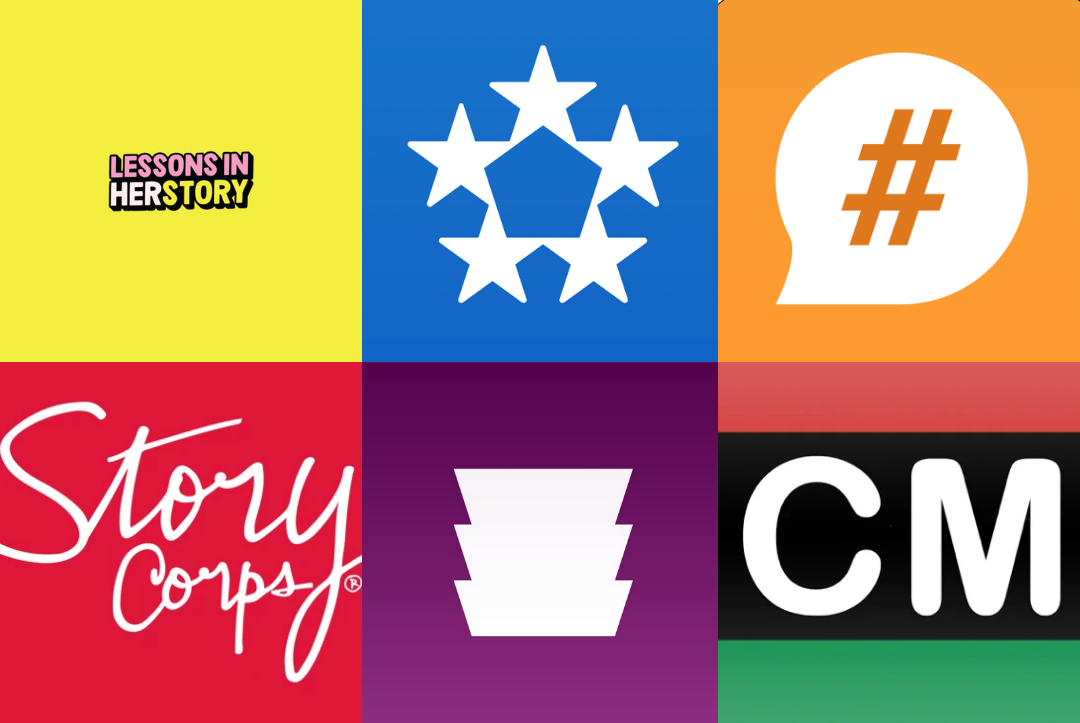Power broker and Bay Street mainstay Wes Hall is looking to change the face of business in Canada—literally.
The executive chairman and founder behind Kingsdale Advisors, Hall has recruited an Avengers-like team of Canadian business heavy-hitters with a shared mission to increase the representation of Black men and women in the boardrooms and executive suites of Canada’s C-suite. Hall recently launched The Canadian Council of Business Leaders Against Anti-Black Systemic Racism and the upcoming BlackNorth summit. With the BlackNorth virtual summit slated for later this summer, Hall and his team have invited senior leaders from the top 250 TSX companies, over 100 of the biggest private businesses in Canada, major banks, insurance companies, and international corporations with a significant presence in the country to sign a CEO pledge that will outline how they plan to combat anti-Black system racism.
You’ve created The Canadian Council of Business Leaders Against Anti-Black Systemic Racism. Can you tell us a little more about your mission statement?
We looked at the history of systemic racism and realized that we’ve been going about it wrong. We, as a society, ask the government to solve problems but guess what happens? They get calls from different people in their constituencies that tell them to leave it alone and because they want to be elected, they do just that. We decided to use a business approach to solve a social problem. We’re trying to solve the barriers that are put in place because of anti-Black racism that results in Black people being left behind and out of the C-suite. Not including us is bad for business. There’s a McKinsey study that was done in 2018 that said if you have a gender-diverse executive team, you’re 21 percent more likely to outperform your peer group and 27 percent more likely to have better value creation in the long-term as a result. It also went on to say that if you have a racially and culturally diverse board, you’re 33 percent more likely to outperform your peer group. When you look at the companies that don’t have that, they’re 29 percent likely to have below-average value in their business.
Not having me in your boardroom or your management team will actually lose you money. We are asking [companies] if it makes business sense to disenfranchise 3.5 percent of the population from the decision-making process. If not, let’s look at the impediments that are causing that and remove them.
Not having me in your boardroom or your management team will actually lose you money.
You’ve also created the BlackNorth summit, which is coming up. What can people expect from that?
We’re hoping to have a number of CEOs that will be present at BlackNorth. So far, we’ve received really great responses from some of the largest companies in Canada and we expect that the top companies in the country will be represented there. They’re going to come to the BlackNorth summit with a CEO pledge that states that they are tackling barriers in our organization as it relates to anti-black systemic racism.
In terms of the pledge, is that something that you are defining internally before you pass it on to these companies to sign?
That’s right, we’re drafting them. We have three other co-chairs—Victor Dodig, who is the CEO of CIBC; Prim Watsa, the CEO of Fairfax Financial; and Rola Dagher, CEO of Cisco Canada. Together, we’re defining targets, timelines, and goals.
We expect that there should be Black representation on boards and in the C-suite. We believe that that’s the minimum. If you tell your company that you’re removing all these barriers that prevent Blacks from being successful, you can’t say that with a good conscience if you’re not doing it. Change starts from the top. It’s a cultural change that we’re trying to affect.
Cultural and systemic changes can take time to implement. What are some short-term goals that we can focus on in the interim?
We look at this as a short-term goal, actually, because we have a template. A few years ago, there were no women in corporate boardrooms or the C-suite. There was a movement with the 30% Club that demanded gender parity. At a minimum, they wanted to see 30 percent of the C-suite composed of women by 2022. When the TSX had their meeting last year, every single one of those companies had a woman on their board. It happened, and they’re going to hit their target in 2022. It’s not impossible, but the argument coming from corporate Canada at the time was that they couldn’t find a capable woman to be on a board or C-suite. Well guess what? They took them out of middle management and put them in senior management, and now these companies are performing better. We think the same thing will happen with Blacks. They’re stuck in middle management and have been with these companies in these positions for years. So either they’re completely unambitious, or there’s a systemic reason that they’re stuck in that position.
A lot of the dialogue surrounding these initiatives manifests in these circular arguments that are based on meritocracy and the idea that you earn what you put in. But they don’t acknowledge the gatekeepers and hurdles that are put in the way of women, the Black and Indigenous community, LGBTQ+ men and women, and people of colour. How do you think that we can circumvent this culture around meritocracy in order to provide a more direct path to the C-suite?
Here’s the thing, back in the seventies these people believed in equality. They were against the Vietnam war and believed the world was going to be a great place. But those are the same people that are preventing others from moving ahead today. The people who were fighting for equality and freedom against war back then are the same ones that are now in those positions. The question is, what happened to them? They got comfortable and complacent. They look to their right and left and don’t even notice the person that’s there because all of a sudden, that person thinks, looks, and does everything like them. They’re comfortable with that environment and don’t want to shake it up. In the seventies, they were uncomfortable with what they saw. Now, they’ve become lazy.
If you’re lagging behind, you’re going to get called out.
In the past few weeks, we’ve witnessed some inspiring change and commitments that companies have made to end systemic racism but a lot of that can feel like lip service. Who is holding who accountable? How are you holding your co-chairs accountable? How are you holding the organizations that you’re working with accountable?
BlackNorth is going to be a repository of all issues Black. We’re going to have committees that are going to tackle different systemic issues facing Black people, and we’re going to also have scorecards to keep track of who’s doing what—and who’s not doing what. We’re going to make sure that we sit with those companies when they’re behind their targets and find out what they’re going to do to fulfill their obligation. Keep in mind, most of these companies are public companies. They’re used to people holding them accountable. They have to announce their quarterly statements and tell the market what they’re going to do at the end of each quarter. If they don’t, they have to explain to the market why they didn’t. The shareholders hold them accountable. We’re going to take the same approach by setting a deadline and make sure that they meet them. If not, we need to find out why and report that information so that our community knows what’s happening. If you’re lagging behind, you’re going to get called out.
What kind of response have you received since you launched the initiative?
There were a ton of people who volunteered their services for free with expertise from lawyers, bankers, doctors, and more. People want to see this because they know it’s right. I have probably about eight committees that I’m going to put together and already have people volunteering to be the chair of those committees and spend time to make sure the needle moves. I’ve never seen anything like it before. People want to be a part of the solution.


And it’s not just people in the Black community, but anyone that wants to make a difference.
Well, look at my co-chairs. I’m the only Black person, so I can tell you that there are people who want to make a difference. This is not a Black problem. It is not a problem for Blacks to solve. We don’t have the keys to the kingdom so we can’t go in and say, these are the changes that need to be made. We have to go to the gatekeepers and get them to assist us. We have to get others who are a part of the system to say that this is wrong and it needs to change. We can’t just kick down the door, we have to get people who are on the inside to make the changes so that it’s easier for the doors to open for us.
This is not a Black problem. It is not a problem for Blacks to solve. We don’t have the keys to the kingdom
There are systemic changes that need to be made but the wheels are turning. Hopefully this is something that is sustained and makes a big impact.
I’m glad that we’re using the word “Black” these days because we haven’t used it to describe ourselves for a long time. Now, we’re telling people that it’s okay to say you’re looking for Black senior management, Black directors, or Indigenous senior management and Indigenous directors. “Diversity” is a catchall phrase. We need to identify what we want within this category and fill it.
What do you think all leaders should ask themselves about how they are leading their companies? What are the hard questions that need to be asked, whether you’re a small business or the CEO of a big corporation?
Ask yourself what culture you want to create. What kind of legacy do you want to leave behind? Are you being inclusive? Are you using all the talent in your organization to the best of their abilities? If you ask yourself these questions, you’re going to build a great company.
Kingsdale Advisors is the number one firm in the nation by a country mile because we are made up of all races and nationalities. We’re the United Nations. People are surprised that we’re so good at what we do. Why? Because we have talent from all over the place that can think differently.
[yikes-mailchimp form=”1″ title=”1″ submit=”SUBSCRIBE”]













